Related Research Articles
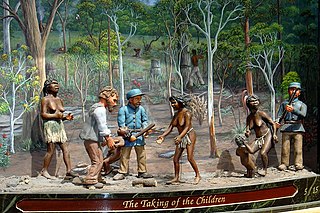
The Stolen Generations were the children of Australian Aboriginal and Torres Strait Islander descent who were removed from their families by the Australian federal and state government agencies and church missions, under acts of their respective parliaments. The removals of those referred to as "half-caste" children were conducted in the period between approximately 1905 and 1967, although in some places mixed-race children were still being taken into the 1970s.
Aden Derek Ridgeway is an Australian former politician. He was a member of the Australian Senate for New South Wales from 1999 to 2005, representing the Australian Democrats. During his term he was the only Aboriginal member of the Australian Parliament. He is currently a spokesperson for Recognise, the movement to recognise Aboriginal and Torres Strait peoples in the Australian Constitution.
Sir Ronald Darling Wilson, was a distinguished Australian lawyer, judge and social activist serving on the High Court of Australia between 1979 and 1989 and as the President of the Human Rights and Equal Opportunity Commission between 1990 and 1997.
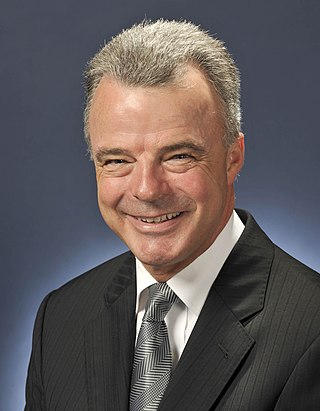
Brendan John Nelson is an Australian business leader and former politician. He served as the federal Leader of the Opposition from 2007 to 2008, going on to serve as Australia's senior diplomat to the European Union and NATO. He now has a global leadership role with Boeing, an aerospace company.

Charles Wilson Tuckey is an Australian former politician who was a member of the House of Representatives from 1980 to 2010, representing the seat of O'Connor in Western Australia for the Liberal Party. He was a minister in the Howard government.

The CanadianIndian residential school system was a network of boarding schools for Indigenous peoples. The network was funded by the Canadian government's Department of Indian Affairs and administered by Christian churches. The school system was created to isolate Indigenous children from the influence of their own culture and religion in order to assimilate them into the dominant Canadian culture. Over the course of the system's more than hundred-year existence, around 150,000 children were placed in residential schools nationally. By the 1930s, about 30 percent of Indigenous children were attending residential schools. The number of school-related deaths remains unknown due to incomplete records. Estimates range from 3,200 to over 30,000, mostly from disease.

Nova Maree Peris is an Aboriginal Australian athlete and former politician. As part of the Australian women's field hockey (Hockeyroos) team at the 1996 Olympic Games, she was the first Aboriginal Australian to win an Olympic gold medal. She later switched sports to sprinting and went to the 1998 Commonwealth Games and 2000 Olympic Games. She was elected to the Australian Senate at the 2013 federal election, after then Prime Minister Julia Gillard named her as a "captain's pick", installing her as the preselected Labor candidate over incumbent Labor senator Trish Crossin. She retired from the Senate in 2016.
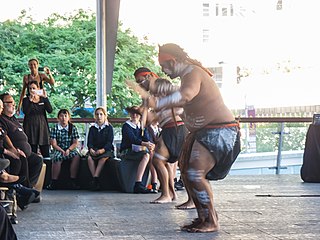
National Sorry Day, officially the National Day of Healing, is an event held annually in Australia on 26 May commemorating the Stolen Generations. It is part of the ongoing efforts towards reconciliation between Indigenous and non-Indigenous Australians.
The history wars is a term used in Australia to describe the public debate about the interpretation of the history of the European colonisation of Australia and the development of contemporary Australian society, particularly with regard to their impact on Aboriginal Australian and Torres Strait Islander peoples. The term "history wars" emerged in the late 1990s during the term of the Howard government, and despite efforts by some of Howard's successors, the debate is ongoing, notably reignited in 2016 and 2020.
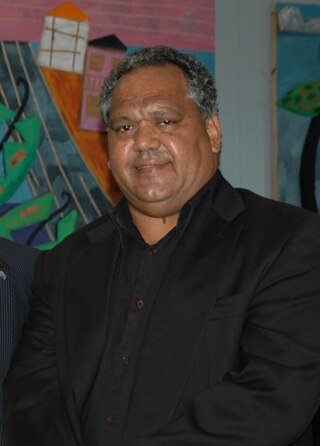
Noel Pearson is an Australian lawyer and founder of the Cape York Partnership, an organisation promoting the economic and social development of Cape York. He is also the Founder of Good to Great Schools Australia an organisation dedicated to lifting education outcomes for all Australian students.

A truth commission, also known as a truth and reconciliation commission or truth and justice commission, is an official body tasked with discovering and revealing past wrongdoing by a government, in the hope of resolving conflict left over from the past. Truth commissions are, under various names, occasionally set up by states emerging from periods of internal unrest, civil war, or dictatorship marked by human rights abuses. In both their truth-seeking and reconciling functions, truth commissions have political implications: they "constantly make choices when they define such basic objectives as truth, reconciliation, justice, memory, reparation, and recognition, and decide how these objectives should be met and whose needs should be served".

Justine Florence Saunders, was an Australian stage, television and film actress. She was a member of the Woppaburra, an Australian Aboriginal people, from the Kanomie clan of Great Keppel Island in Queensland. On the small screen she appeared in numerous series, mini-series and telemovies.
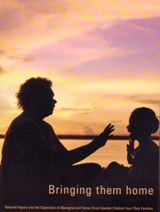
Bringing Them Home is the 1997 Australian Report of the National Inquiry into the Separation of Aboriginal and Torres Strait Islander Children from Their Families. The report marked a pivotal moment in the controversy that has come to be known as the Stolen Generations.
Indigenous Australians are people with familial heritage from, or membership in the ethnic groups that lived in areas within the Australian continent before British colonisation, or both. They consist of two distinct groups: the Aboriginal peoples of the Australian mainland and Tasmania, and the Torres Strait Islander peoples from the seas between Queensland and Papua New Guinea. The term Aboriginal and Torres Strait Islander peoples or the person's specific cultural group, is often preferred, though the terms First Nations of Australia, First Peoples of Australia and First Australians are also increasingly common; 812,728 people self-identified as being of Aboriginal and/or Torres Strait Islander origin in the 2021 Australian Census, representing 3.2% of the total population of Australia. Of these Indigenous Australians, 91.4% identified as Aboriginal; 4.2% identified as Torres Strait Islander; while 4.4% identified with both groups. Since 1995, the Australian Aboriginal flag and the Torres Strait Islander flag have been official flags of Australia.

Kenneth George Wyatt is an Australian former politician. He was a member of the House of Representatives from 2010 to 2022, representing the Division of Hasluck for the Liberal Party. He is the first Indigenous Australian elected to the House of Representatives, the first to serve as a government minister, and the first appointed to cabinet.

On 13 February 2008, the Parliament of Australia issued a formal apology to Indigenous Australians for forced removals of Australian Indigenous children from their families by Australian federal and state government agencies. The apology was delivered by Prime Minister Kevin Rudd, and is also referred to as the National Apology, or simply The Apology.
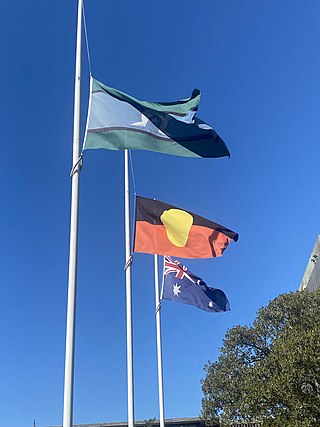
Reconciliation in Australia is a process which officially began in 1991, focused on the improvement of relations between the Aboriginal and Torres Strait Islander peoples of Australia and the rest of the population. The Council for Aboriginal Reconciliation (CAR), created by the government for a term of ten years, laid the foundations for the process, and created the peak body for implementation of reconciliation as a government policy, Reconciliation Australia, in 2001.
Melissa Brickell is an Indigenous Australian welfare worker based in Melbourne, Australia. She served as Director of Reconciliation Victoria and was the Chairperson for the Stolen Generations Sorry Day Committee and the Stolen Generations Alliance. She also served on the National Aboriginal and Torres Strait Islander Catholic Council and the National Aboriginal and Torres Strait Islander Ecumenical Commission.
References
- ↑ Brennan, Sean (2004). "Reconciliation in Australia: The Relationship Between Indigenous Peoples and the Wider Community". Brown Journal of World Affairs . 11 (1): 149–161. ISSN 1080-0786. JSTOR 24590504 . Retrieved 10 October 2021.
- ↑ "About Bringing Them Home". Australian Human Rights Commission. Archived from the original on 14 September 2023. Retrieved 14 September 2023.
The National Inquiry into the Separation of Aboriginal and Torres Strait Islander Children from Their Families was established by the Attorney General in 1995. Over two years, the National Inquiry took oral and written testimony from over five hundred Aboriginal and Torres Strait Islander people across Australia, as well as from Indigenous organisations, foster parents, State and Territory Government representatives, church representatives, other non-government agencies, former mission and government employees and individual members of the community. The 689 page final report, tabled in Parliament on 26 May 1997, includes many of these personal testimonies as well as 54 recommendations to support healing and reconciliation for the Stolen Generations, their families and the Australian public more broadly.
- 1 2 3 4 5 Brennan, Frank (21 February 2008). "The history of apologies down under". Thinking Faith . Retrieved 10 October 2021.
- 1 2 3 4 Wright, Tony; MacDonald, Janine (25 August 2021). "From the Archives, 1999: Howard sends his regrets". The Age . Retrieved 10 October 2021.
First published in The Age on August 27, 1999.
- ↑ Wright, Tony; McDonald, Janine (25 August 2021). "From the Archives, 1999: Howard sends his regrets". The Age. Archived from the original on 14 September 2023. Retrieved 14 September 2023.
- ↑ Parliamentary Hansard, 26 August 1999; parlinfo.aph.gov.au
- ↑ "Motion of Reconciliation: Senator Hill". Parliament of Australia [Hansard]. 26 August 1999. Retrieved 10 October 2021.
- ↑ "Motion of Reconciliation: Senator Faulkner". Parliament of Australia [Hansard]. 26 August 1999. Retrieved 10 October 2021.
- ↑ Ridgeway, Aden (26 August 1999). "Ridgeway defends motion on Stolen Generations". Australian Broadcasting Corporation (Interview). PM Archive. Interviewed by Kirk, Alexandra. Retrieved 10 October 2021.
- ↑ Hoare, Daniel (7 February 2008). "Opposition joins rush to say sorry". ABC News. Retrieved 10 October 2021.
- ↑ "National apology". Canberra: National Museum of Australia . Retrieved 10 October 2021.
- ↑ Daley, Paul (13 February 2018). "The Apology 10 years on". Museum of Australian Democracy . Retrieved 10 October 2021.
- ↑ Lo, Ping (12 February 2008). "The words Rudd will use to say 'sorry'". Australian Broadcasting Corporation. Retrieved 10 October 2021.